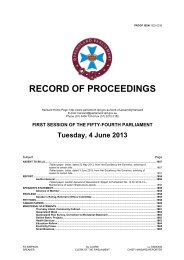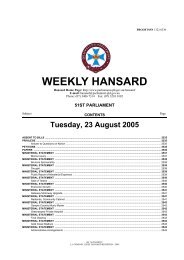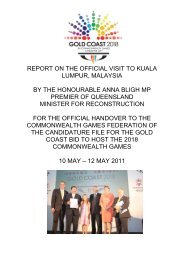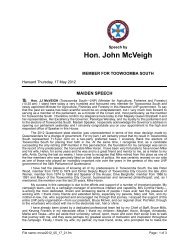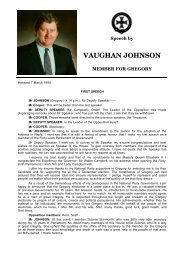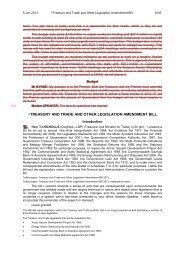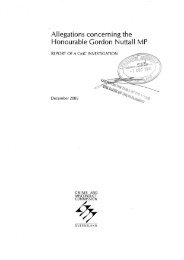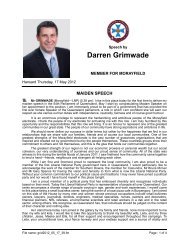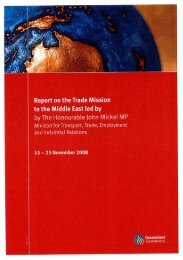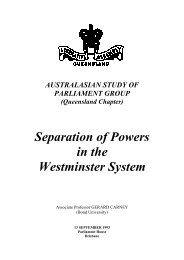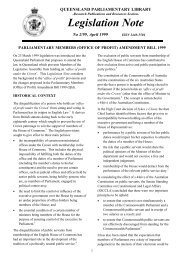Full transcript - Final - Queensland Parliament - Queensland ...
Full transcript - Final - Queensland Parliament - Queensland ...
Full transcript - Final - Queensland Parliament - Queensland ...
Create successful ePaper yourself
Turn your PDF publications into a flip-book with our unique Google optimized e-Paper software.
9 Mar 1999 Matters of Public Interest 335<br />
The Regional Communities Program<br />
involves eight regional centres throughout the<br />
State. It will provide a means for regional<br />
communities to identify and prioritise their<br />
specific issues and needs, and will influence<br />
the Government decisions affecting their<br />
regions. Ministers will hear first-hand how<br />
people in regional <strong>Queensland</strong> want the<br />
Government to respond to their needs.<br />
I refer to a Cairns Post article that was<br />
published on the Saturday after the<br />
conference, which referred to some comments<br />
that were made by the Minister. The article<br />
states—<br />
" 'I am here to listen to what you say,'<br />
he told the 500 delegates from all over<br />
the Far North. 'What should the<br />
Government do?'<br />
Mr Mackenroth agreed it was no<br />
longer good enough to tell people what<br />
the issues were.<br />
'These days you want to work<br />
together with us to achieve outcomes,' he<br />
said.<br />
The minister said later the program<br />
would give the regions 'a direct line to the<br />
executive building in Brisbane'."<br />
That is the kind of influence and involvement<br />
that people in regional <strong>Queensland</strong> are looking<br />
for.<br />
One of the key features of the program<br />
will be four quarterly ministerial forums that will<br />
be held in each region each year. Two<br />
Ministers will attend each forum, together with<br />
20 local community delegates who will<br />
represent the various social, business and<br />
Government sectors that make up the<br />
community. Those members will be selected<br />
by local community leaders who will<br />
themselves have been nominated by the local<br />
community. This process will be genuinely<br />
driven by the community rather than by the<br />
Government. The forums will not just be<br />
talkfests or an airing of grievances, because<br />
the Government knows that it is not good<br />
enough to just listen; it needs to act on what it<br />
hears and it needs to deliver to regional<br />
<strong>Queensland</strong>. The Ministers will report back<br />
either before or at each of the forums,<br />
describing the action that the Government has<br />
taken concerning the issues or projects that<br />
were raised at the previous forum.<br />
The agenda for the first ministerial forum<br />
in each region will be set by the outcomes of<br />
community conferences such as the one just<br />
held in Cairns. At the Cairns conference,<br />
members of the community had an<br />
opportunity to select one of eight specific<br />
interest areas and then, in a small group<br />
setting, generate ideas and issues and report<br />
back on their group's deliberations. I<br />
congratulate the manager of the program, Nick<br />
Ryan, and his team who did an outstanding<br />
job of facilitating the process throughout the<br />
State. Certainly the feedback I received in<br />
Cairns was overwhelmingly positive, even from<br />
people who regularly attend functions such as<br />
this and who, I can assure the House, are<br />
quite discerning when it comes to methods of<br />
consultation.<br />
I would like to share with members some<br />
of the highlights from the reports of those eight<br />
interest sectors to give members a feeling for<br />
and a better understanding of the priorities of<br />
our region. These are only some of the issues<br />
that have been selected from a whole range<br />
that were presented by each group. They<br />
certainly do not comprise all the issues and<br />
priorities that the groups raised.<br />
The business and industry group<br />
proposed that within two years all State<br />
Government decision-making policies and<br />
practices be allied with the region's own<br />
identified economic destiny. The community<br />
development group proposed the building of<br />
an academy of sport and the arts in the region<br />
by the year 2000 to develop the potential of<br />
young athletes and performers in far-north<br />
<strong>Queensland</strong>. I will come back to that issue and<br />
discuss it in further detail at another time. The<br />
community support group's priority was to<br />
establish regional one-stop shops for<br />
information referrals and issues advocacy, to<br />
bridge gaps between clients, services and<br />
Government and to promote service<br />
development, to be in place by the next<br />
Budget.<br />
The education group referred to the need<br />
to develop a strategic direction that has broad<br />
bipartisan support. It proposed that the<br />
Minister should set up a task force to develop<br />
a strategic direction for education for the next<br />
5 to 10 years. The environment group called<br />
on Government to address sewage and waste<br />
infrastructure, eliminate the impact on the<br />
environment, and investigate and implement<br />
innovative technology. The health group called<br />
for the provision of equitable health services<br />
throughout the far-north <strong>Queensland</strong> region by<br />
outreach strategies such as community<br />
consultation, the review and prioritising of<br />
funding resources and the establishment of a<br />
task force to compare health needs and<br />
resources.<br />
The law, order and justice group, including<br />
emergency services, wishes to see the<br />
utilisation of a broad range of programs and



